|
Dusty Dog Reviews The whole project is hip, anti-academic, the poetry of reluctant grown-ups, picking noses in church. An enjoyable romp! Though also serious. |

|
Nick DiSpoldo, Small Press Review (on Children, Churches and Daddies, April 1997) Children, Churches and Daddies is eclectic, alive and is as contemporary as tomorrow’s news. |
Volume 217, February 2011
The Unreligious, Non-Family-Oriented Literary and Art Magazine
Internet ISSN 1555-1555, print ISSN 1068-5154
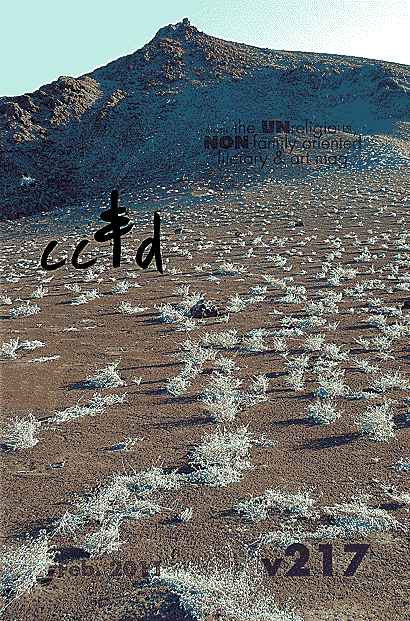
see what’s in this issue...
Note that in the print edition of cc&d magazine, all artwork within the pages of the book appear in black and white.
|
Order this issue from our printer as a a paperback book (5.5" x 8.5") perfect-bound w/ b&w pages You can also get this from our printer as a a ISBN# paperback book (6" x 9") perfect-bound w/ b&w pages |

poetry
the passionate stuff
sanctityJohn Thompsonauthor of ‘black petal rose’
make-up like a geisha
your beauty masked
your lips
you cry an emerald
|
| Janet Kuypers reading the John Thompson poem Sanctity from the February 2011 issue (v217) of the lit mag cc&d magazine (which is also available as a 6" x 9" ISBN# book Life... from Nothing |
|
Watch this YouTube video read live 02/08/11, live at the Café in Chicago 02/08/11 |

Maria, art by Brian Forrest
Brian Forrest Bio:Born in Canada and bred in the U.S., Brian Forrest works in many mediums: oil painting, computer graphics, theatre, digital music, film, and video. Brian studied acting at Columbia Pictures in Los Angeles, digital media in art and design at Bellevue College (receiving degrees in Web Multimedia Authoring and Digital Video Production.) He works in the Seattle, WA area in design/media/fine art. Influenced by past and current colorist painters, Brian’s raw and expressive works hover between realism and abstraction.
|
Invisible FuelJe’free
It was not the wind that pushed
The corrupt politician confesses his secret -
Maybe one day, we will master
|
Like the Jews in WarsawFritz Hamilton
Like the Jews in Warsaw, the
replace my floor & paint my walls &
the Huns/ they’ll take everything, like
pet roaches/ then they’ll stuff me into
since I’m 74 & bound for the eternal
shoot me beside the railroad track &
to death for human purity/ instead
already dead, & so am I/ that
the virgin birth & all that wise suffering before
dead in his Easter basket, no matter how
thank the murdered Lord that nothing, sweet nothing, just
nothing ...
!
|
Jesoo beats the cross untilFritz Hamilton
Jesoo beats the cross until it
eyeball impregnates as
burns with the rapists & the papists &
beat down the abortionist’s door to
more papist rapists & child molesters to
thrust!
again the cross squirts in HURTS ... !
|
Fair EnoughCEE
Mentally ill yoga partner
|
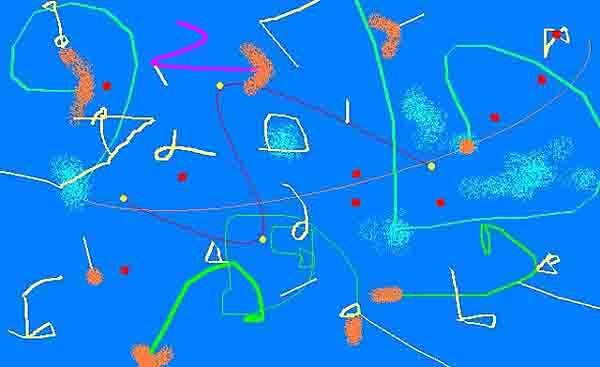
Scatter, art by the HA!man of South Africa
What I woke to writeRebecca Shepardmy bed
stained to a different life
one without children
connected, however,
the sheet that will never
after your quivering body
i slept on my hands see? some things do remain.
|
ChinchorroJon Mathewson
The parents peeled back the skin and flesh
|
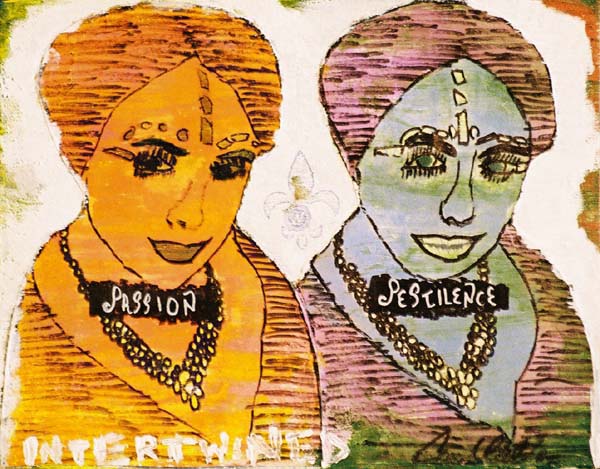
Intertwined, art by Aaron Wilder
Reading at a Bookstore’s Open Mic.Matthew Guzman
I normally hate these things.
The host calls my name,
|
Mr. Flip as a BlackboxKristine Ong MuslimThe trick is to stay alive. But most days, there are no choices left. Mr. Flip is now the only survivor after the crash. A metal box of recorded frequencies. There is no lid to this box, no flaps that can open upwards. All tongue and no lips makes Mr. Flip a good mimic. If he can only stand up, if he can only shapeshift his way out of his natural boxlike configuration, then he will walk away from this carnage of smoke and twisted metal. He will wander until he will reach a town, perhaps, a roadside where he can hitch a ride home. By sundown, Mr. Flip will have learned to ignore the noise. He will have his own feet to tread on the bones of sparrows, of roadkill grit. How they crackle like the broken finger bones of sickly girls, their unrehearsed prayers turning into sighs.
Previously published in The, June 22, 2009
|
RecognitionMichael Larrainfor Wilder Kathleen
In late April
|
Author bio
Michael Larrain was born in Los Angeles in 1947. He is the author of three collections of poems: The Promises Kept in Sleep, Just One Drink for the Diamond Cutter and For One Moment There Was No Queen. Rainy Day Women Press of Willits, CA, has released a CD of his reading of selected love poems called Lipstick: A Catalogue for Continuous Undressing. His novels are South of The North Star, Movies on the Sails, and As the Case May Be. His children’s storybooks are The Girl With the Loom In Her Room, Heaven & Earth and Homer the Hobo & Ulysses the Goat.
|
The ShiningCopyright R. N. Taber 2010
Boy drops a shiny new coin
Boy reaches an expanse
Boy whose coin it was
No surprises then
|
A Mother’s Take on Librarians,
Robert Lawrence |
Just Out of Reach
Janet Kuypers |

Watch this YouTube video live 10/08/10 at the Chicago Public Library (Avalon Branch), with cello from the HAman of South Africa |
Keeps Pounding Against WallsJanet Kuypers08/30/10
I feel this pain in my chest
this isn’t heartburn,
but I think I know
I don’t know what trapped my heart
so hard that it’s slamming on those walls
god, I don’t even know about the walls
I don’t know about the walls
| |||||||||||||||
On AshesJanet Kuypers5-5-7 haiku-styled poem, 09/18/10
Dachau’s gas chambers
|
At the CampJanet Kuypers09/18/10 Haiku
through wind, sleet or rain
|
CappuccinoSara Basrai
We’re 18 in 1989
|
| Sara Basrai bio Sara Basrai is a UK citizen who lives in NYC. Before moving to the USA, she worked in schools across London and worked with children from different cultural and social backgrounds. Her writing appears or is forthcoming in 34th Parallel, Outwardlink.net, Battered Suitcase, Cantara Press and in an anthology called The Cloud. Her poetry will be published in Grey Sparrow Press and Nefarious Ballerina. She has also presented work on sites supporting biracial couples. Sara’s desire as a writer is to present stories, which surprise and raise questions. |
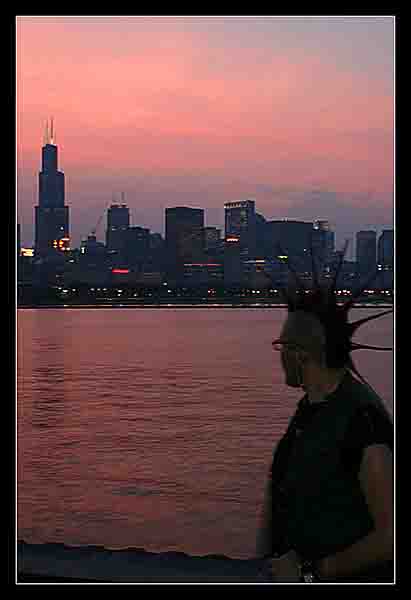
Summer’s Almost Gone, art by Nick Brazinsky
Arbitrary ThoughtsGPA (The Poetic Unsub)www.iblowyourmind.com www.myspace.com/gpagreatestpoetalive https://facebook.com/greatestpoetalive
The education system is failing in the inner city.
|
| Janet Kuypers reading a poem by GPA (the Poetic Unsub) read from cc&d magazine |
|
12/21/10, live at the Café in Chicago |
CleopatraJudith Ann Levison
My edge has left me
I can’t say you are the only one to know me
|
On a Bicentennial Remembrance: February 12, 2009Michael Ceraolo
I awoke in the late morning after a long night of reading,
|
HopeJoy Davis
There’s a dark side
Instead it grows in power
They kill whatever stands in its way
Every night it sheds its white cloak
|
If PeopleMaxwell Baumbach
if people and
if people but
if people
|
| enjoy video of part one of the Maxwell Baumbach Feature which includes this poem (and also has an intro of Maxwell Baumbach poetry accepted in issues of cc&d magazine by editor and the Café host Janet Kuypers) |
|
|
Maxwell Baumbach BioMaxwell Baumbach is a writer from Elmhurst, Illinois. You can see him at www.youtube.com/MaxwellThePoet. He is also the editor of the new publication Heavy Hands Ink. His work has appeared in Opium Poetry 2.0, The Cynic Online Magazine, Thunderclap!, Record Magazine, Black-Listed Magazine, and Five Fishes Journal. It is upcoming in vox poetica, Yes, Poetry, Clutching at Straws, and The Shine Journal. He enjoys watching pro wrestling, which is totally real, as well as reading obscene amounts of poetry.
|
DustLucy Winrow
I didn’t hear it get quieter
I’d look then forget
It soon got hard to breathe
But when help came with a can
|
A Saving ComplimentDennis Kerr
One fine morning myself
I was walking
not thinking of
I happened to glance “how do you feel?”
I replied with an honest answer:
His eyes got real big “well you look great.”
|
CobblerDan Fitzgerald
She looks down
|
Don’t Stop Believing (#1)Kenneth DiMaggio
Loner in the landscape
listening to the music
and what were
|
untitledTom Roby
cream floats on coffee
|
| Tom Roby reading his Untitled Haiku from memory (which appeared in the February 2011 issue (v217) of the lit mag cc&d magazine (which is also available as a 6" x 9" ISBN# book Life... from Nothing, as well as the 2011 Scars Poetry Wall Calendar) |
|
Watch this YouTube video read live 03/08/11, live at the Café in Chicago |
|
Watch this YouTube video read live 03/15/11, live at the Café in Chicago |
| Janet Kuypers reading a poem by Tom Roby read from cc&d magazine |
|
12/21/10, live at the Café in Chicago |

Flight, art by Mark Graham
Under the Cherry BlossomJenna Mary
I like to take walks when I’m drunk
|
Things, We CarryAE Baer“The Daily Ad is Conflagration.”
1.
2.
3.
4.
5.
But I am only human
6.
|
Voices WithinLinda Webb Aceto
Voices flail the chorus,
Ice packed blue surrender
Tone on one, barely there,
|
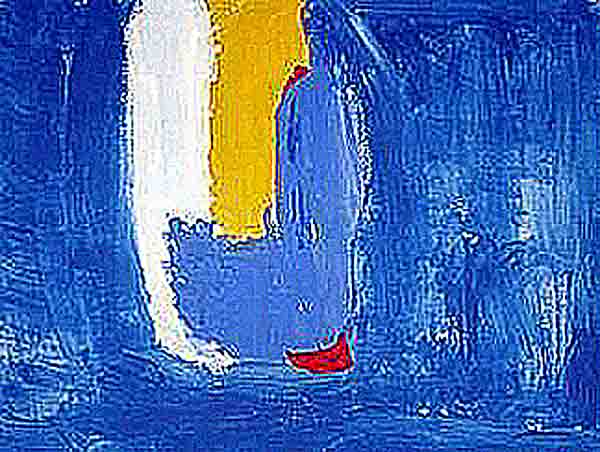
New Port Beach 1963, painting by Jay Marvin
Comparative LiteratureMichael Battram
“So you want to be
“The jobs, the drinking,
“Of course not, shit,” I snapped
I think now maybe I wanted
|
Michael Battram BioMichael Battram lives in Indiana, works in Kentucky, and writes in his car. His poems have appeared in a wide variety of forms, styles, and publications, from academic to alternative to “ashcan,” and someday he hopes to find out if he’s the only poet to appear in both The Lyric and Wormwood Review.
|

“Alouette”
(the actual song lyrics)
“Alouette”Many Americans know the song “Alouette”,but have no idea what the words really mean. These are French and English lyrics of “Alouette”, a Chlildren’s song (not under copyright) about plucking the feathers off a skylark, a small bird. It originated with the French Canadian fur trade.
Alouette, gentille Alouette
Alouette, gentille Alouette The song continues for each bird part:
* Et le cou
Alouette, gentille Alouette
|

prose
the meat and potatoes stuff
a Fractured FairytaleBarb Chandler
“When you marry your knight in shining armor you’ll live happily ever after.”
|

Cartoon by David Sowards
Stonehenge and the FluAnne Turner Taub
The flu is the kind of illness that you know won’t kill you but you don’t care. You want to die anyway. You’re sick and miserable and it’s never going to end. Just the Machiavellian memory of one more tissue raking viciously through the skin on your raw, red nose—
|

The GiftJohn Duncklee
Everyone at Housatonic High School took it for granted that Joe and Margie would marry soon after graduation, or at least once they had graduated from college. Joe had some misgivings about college because he was having plenty of trouble getting through high school algebra. After one of their discussions about their future, Joe had expressed his feelings about algebra to Margie. “I am convinced that I am mathematically challenged,” he said.
Before the graduation ceremony Joe was restless. He wanted more than anything for all of it to end so he could get to New York City and Grand Central Station to leave for Wyoming. He was also apprehensive about seeing Margie. He had not told her about his plans because he didn’t want to listen to her cry and carry on about their future together. He had decided that before he could ever think about a future with anyone he would have to become what he wanted to be, a cowboy.
Joe found his cowboy job within a week after his arrival in Sheridan. He also discovered that besides taking care of the cattle cowboys in that part of the country also helped put up hay in the summer. Joe didn’t mind doing anything as long as he could wear his cowboy hat and Levis. He worked in northern Wyoming for several years until he met a man from Colorado in the Mint Bar on Main Street in downtown Sheridan. The man had a ranch near Greeley, and offered Joe a job he couldn’t turn down. He packed his gear and became the man’s ranch manager with a herd of a thousand cows.
After ten years as a ranch manager, Joe learned that the owner had sold his spread to a land developer. That was the end of that good job for Joe. He didn’t look around for another ranch to manage; his thoughts went back to the time when his high school English teacher had told him that he should be a writer. Joe had always saved most of his paycheck. His financial situation had improved when his parents died and left him a portfolio of sound investments. Joe moved to Denver and found a small house to rent where he could stay and write stories about horses and cattle.
|
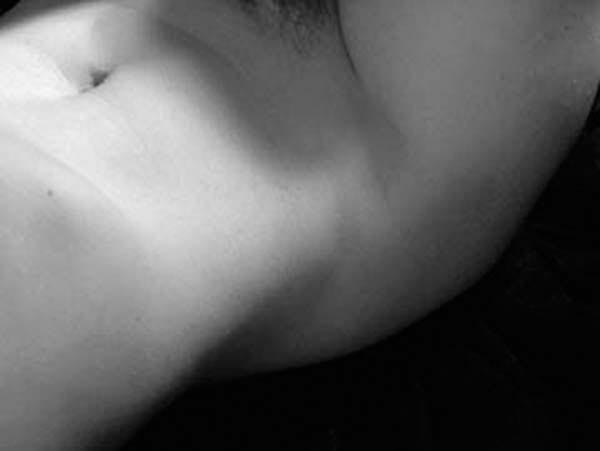
Shadows, art by Cheryl Townsend
Jamaica FarewellBarbara Villemez
Her long fingers twisted together as they lay entwined in her lap. The paleness of her hands and thin arms contrasted with the dark blue of her wool skirt. She sat still, legs primly crossed at the ankles. A stray lock of stringy blonde hair fell across her forehead and she nervously pushed it behind her ear. Her anxious eyes searched the face of the doctor seated across from her.
|

art from Calakmul by Brian Hosey and Lauren Braden
A Piece of AmericaOz HardwickA bland motel in the Mid-West. Grand Rapids, maybe, though it’s not too grand and nothing’s moving at all. Snowbound. Casual conversations with the few other guests dried up after the first night, with nothing to talk about but the weather, and that’s stayed the same. There are sit-coms on TV, so broken by adverts that by the time the programme comes back he’s lost the thread. The other option is the news, which is all about the weather, and that’s stayed the same. On balance, the ads are the best thing on, full of false hope and cynicism, with slogans almost haiku-like in their sadness:
The airport is tantalisingly close, but who knows when the next plane will leave? So here he is, drifting between adverts on TV and blank snow through the window, trapped in a small piece of America, where the dream has become recurring and everything stays the same. He is running on two timescales, six hours apart, phoning in the gaps between disjointed patterns of work and sleep, making tired conversation with nothing to say. But now, in the early evening, it is her small hours and she will be sleeping. On a whim, with something like recklessness and something like desperation, he picks up the phone, pushes 9 for an outside call, and hits numbers at random. What will the response be? Confusion? Indignity? Fear? It doesn’t matter – he just needs to hear a voice. A ringtone, then silence. But not true silence. Instead, it is a silence crackling with distance, the echo of falling snow, and everything staying the same.
|
| Oz Hardwickreading his poem a Piece of America in a 2011 issue of cc&d magazine (and also available in the 6" x 9" ISBN# cc&d edition collection book Literary Town Hall |
|
Watch this YouTube video read live 04/19/11, live at the Café in Chicago |
My Female IntuitionRufus Ryan
As I waited for my bus, I smoked cigs while I looked at strangers.
|
Out Of The ShadowsSonia Segura
I can remember a time when things that go bump in the night were the stuff of nightmares. I was always scared and ended up sleeping with my Grandma. She lived with my family and I in humid Louisiana.
|

Conspiracy!Alex Moreaux
The key was in the spaces. On this intersection the space between the lines of the crosswalk measured two inches narrower than the spaces between the crosswalk lines at the intersection a block away. This minor difference in spaces might not strike the lay person as catastrophic but it did cause there to be one less stripe on the one intersection. That was key! One less stripe!
Alan Giffin’s parents drank a lot. Anything that came out of a bottle was fair game to make into a beverage. If they found any fluid left anywhere, they threw that into the grand mixture in an old alcohol bottle that lost its label such a long time ago that nobody could quite remember how the bottle came into being in the Giffin house. Alan didn’t mind his parents drinking because they became more conversational during those hours. They rejoiced his twenty-first birthday by going to the liquor store themselves instead of sending Alan with a fake ID and extra money in case he needed to give a small bribe to stay out of trouble. This never happened; nobody cared about age in small towns. Everybody knew his age anyway. He kept the extra money.
Alan ran from them for a solid two weeks. He ate crops from farmers’ fields, tore the mold from old bread he pulled out of trashcans, and found an unopened package of jerky that he abandoned because he was sure they left it out for him. The third week brought unexpected blessings for Alan when he tripped (literally) over a box of used crayons. A sign from the anti-conspiracy!
|
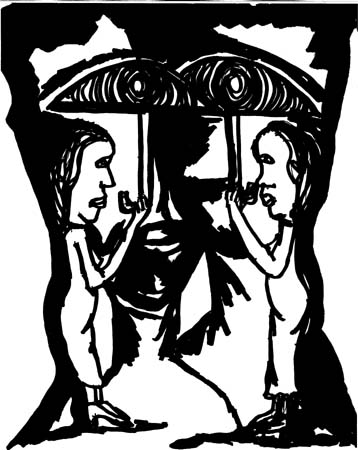
Umbrella Logic, art by Edward Michael O’Durr Supranowicz
Here, Kitty KittyCynthia Black
Tick, Tick, Tick, Tick.
|
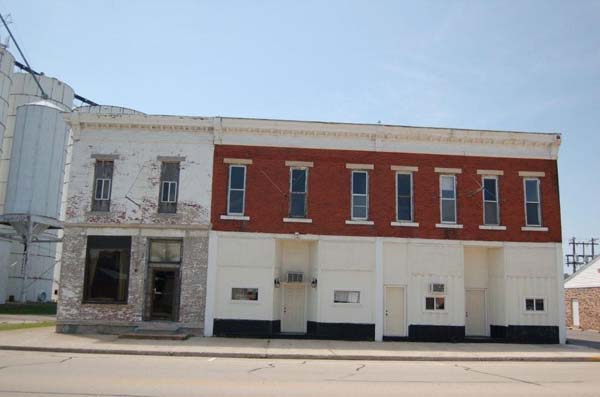
Summer2007 049, art by David Thompson
Parking Lot, 9:44 p.m.Mark Bohm
The panhandler calls out to us, says his car is at the nearby gas station, in front of pump number one, out of gas. Tells us he needs four gallons to get back home. June rolls her eyes, keeps walking toward the food store. Panhandler keeps talking. From out of town, New Jersey, works construction there. Staying with his grandmother in Palm Beach, on vacation. Drove to Lauderdale to meet friends but he’s been stood up. Obviously bullshit. But the guy is young, just a kid, maybe early-twenties, with a flop of friendly black curls, and eyes with an innocent shine. Says he’s embarrassed to be asking, also bullshit probably, but he sounds distressed. I take a few steps back to the car, dig around for change, feel June’s annoyance pressing without having to look, ask what kind of car he drives, he says it’s a Chevy four wheel drive. Give him a little more than a buck in quarters and dimes, tell him I’m not going to be able to give enough for four gallons, he says didn’t expect that much, and thanks, god bless, all that. I figure grocery parking lot has plenty of cars, steady stream of customers, he’ll gather a few bucks in no time and be off.
|
The Imposter With Dark GlassesR. M. Kozan
I admit it started with the lost wallet I found but it wasn’t until almost a year later that the plan formed in my head. The picture in the wallet drew me. The man’s age and details approximated my own. Sure he was several inches taller and tens of pounds heavier. I imagined he was more imposing than my own not-quite-average height and slight frame allowed but there were similarities. The age was bang on, and the hair color was very close. There was something about his face that was familiar to me and it took a while for our close resemblance to register.
|

#26, art by Eric Bonholtzer
To Hit a Woman (Lightly)Andrew Bowen
The force of my husband’s open hand spun me to the living room floor. Neon sparks flashed around me like my first Fourth of July. The copy of the Qur’an Dr. Bakhtiar gave me at the library tumbled out of my hand and lay open in front of me. I remembered the last line of chapter 4, verse 34. “...as to those (women) on whose part you fear desertion, admonish them, and leave them alone in the sleeping places and (daraba) go away from them—”
Ali looked up at me from a crowd of friends as I pulled up to the school. I smiled and waved but rolled my lips over my teeth, self-conscious of the chip in my incisor Seyyed had given me during a past argument. He slung his green book bag over his shoulder and waved goodbye to his friends. I glanced in the rearview mirror to ensure the fresh makeup I applied at the stoplight concealed my wound. He opened the back door and hopped into his booster seat.
He was a medical student in Cairo, an ungainly young man uncomfortable socially and happy only in the company of his studies. Under pressure from his parents, he gave in to taking a wife. The cost of Seyyed’s schooling broke his parents and thus what they could offer for a respectable dowry was pitiful at best.
My daydream ended at a red light that led into our subdivision. Ali hummed in the backseat as he turned pages in his science book. I closed my eyes, the pain in my jaw still throbbing in my head. I opened them and looked in the front passenger seat. The Qur’an Dr. Bakhtiar had given me lay closed, seemingly innocuous until opened—like Pandora’s box. I wanted to regret listening to her, but I couldn’t. I wanted to ignore the sweet freedom and reason of her words, but to no avail. Like Adam and Eve in the garden, the price I was paying for knowledge was suffering.
I lifted my chin and sat up straight and proud as we crossed over the city limits into the countryside. Fields of corn rushed by in a blur of green. A flock of geese spear-headed east toward a pond a few miles up on the right.
We pulled over on the shoulder of the road where a dirt path spotted with clumps of ankle-high grass winded toward an abandoned mill next to the pond. Sunlight burned my eyes as I stepped out of the car and rounded the front. Ali was already out, a wide grin turning his cheeks red as he looked out on a shaded pool adjacent to the pond.
“Stupid woman!” Seyyed said and slapped my other cheek. I staggered backward and sat on the couch with my hand on my face. “I can’t believe you did that, and ignored my call.” I made ablution for evening prayers and washed the makeup and mud off my face in the shower. Tears mixed with the water and burned as they seeped into the cut on my lip from Seyyed’s latest blow. The steam choked me as I wept. I bent over and sat down in the shower, the weight of my reality forcing me to the floor.
We prostrated facing East, Ali on my right and Seyyed reciting sura on my left. We rose in unison, still on our knees. I glanced right at the dagger on the end table. An emerald on the sheath shimmered, as if an angel had winked in approval.
Seyyed pulled the chain on his bedside lamp. The thick, silent dark pressed against my body like a wet blanket. I lay on my back as panic shook me. The dagger was missing when I had tried to sneak it away before bed. Had Seyyed overheard my prayers and hid the blade?
|
Andrew Bowen bioAndrew’s fiction and essays cover the often murky waters of theology, and have appeared in over a dozen publications including Metazen, decomP, On the Wing, Nanoism, and more. He is the founder and editor-in-chief of Divine Dirt Quarterly and blogs atThe Dirty Prophet.
|
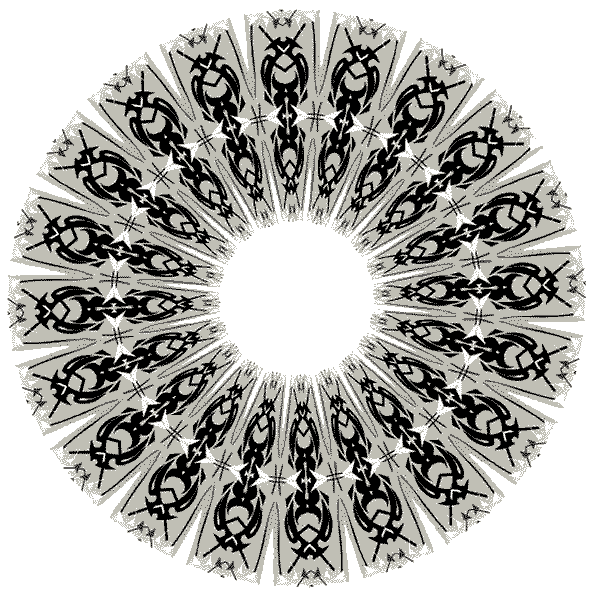
8DK-UZEYIR CAYCI 09.05.2010, art by Üzeyir Lokman ÇAYCI

Debra Purdy Kong, writer, British Columbia, Canada I like the magazine a lot. I like the spacious lay-out and the different coloured pages and the variety of writer’s styles. Too many literary magazines read as if everyone graduated from the same course. We need to collect more voices like these and send them everywhere.
Children, Churches and Daddies. It speaks for itself. Write to Scars Publications to submit poetry, prose and artwork to Children, Churches and Daddies literary magazine, or to inquire about having your own chapbook, and maybe a few reviews like these.
what is veganism?
vegan action
MIT Vegetarian Support Group (VSG)
functions:
For More Information Please Contact: Deborah Anderson dja@crest.org or (202) 289-0061
 
|
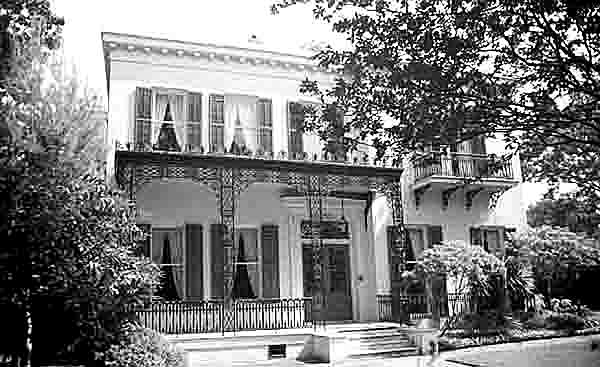 Since usually I’m afraid of anything that mentions any type of ghostly sighting, I had to wonder about myself and why I would even fantasize about a guy that had long been dead? But somehow I did not feel fear, but curiosity.
Since usually I’m afraid of anything that mentions any type of ghostly sighting, I had to wonder about myself and why I would even fantasize about a guy that had long been dead? But somehow I did not feel fear, but curiosity.